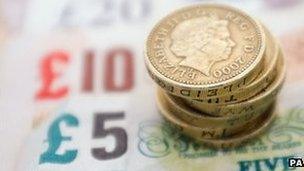Margaret Hodge: Tax laws 'influenced by big firms'
- Published

The Public Accounts Committee will question accountancy firms.
New tax laws are too heavily influenced by major corporations and accountancy firms, the chairwoman of the Public Accounts Committee (PAC) has claimed.
The government "only talks to those who have a self interest in reducing their tax contribution", Margaret Hodge said.
On Wednesday representatives of the UK's biggest accountancy firms are due to be questioned by MPs on the PAC.
Treasury minister David Gauke said it was vital to listen to firms, "but we expect businesses to pay their tax".
Last week Prime Minister David Cameron told leaders at the World Economic Forum in Davos that countries must work together to clamp down on tax avoidance.
Offshore finance
Speaking to the BBC, Mrs Hodge said working groups set up by the government to discuss a series of tax reforms were too heavily dominated by those with something to gain.
Legal changes which come in this year include tax breaks for companies which patent their products.
Another controversial change allows companies which have offshore finance arms to pay just a quarter of the standard 23% rate of corporation tax.
Two managers from accountancy firm KPMG were among those seconded to the Treasury to help formulate tax changes.
Those managers are now named on brochures produced by KPMG for potential clients, telling them how they might use the changes to reduce their tax bills, the BBC has learned.
Some of the companies appointed to the working groups have been in dispute with HM Revenue & Customs (HMRC) about their tax bills.
In July 2010, Vodafone settled a long-running dispute over its Controlled Foreign Companies (CFC) arrangements with HMRC, agreeing to pay £1.25bn.
Vodafone's head of tax, John Connors, was named as a member of the Treasury working group helping to rewrite CFC rules soon afterwards.
Vodaphone said it had a policy of complete transparency with all tax authorities and added: "As one of the UK's leading multinational companies and a significant taxpayer worldwide - for every £4 we make in profit, we pay £1 in tax around the world - are we not entitled to make our opinion known when the opportunity arises to do so?"
'Legitimate objectives'
Mrs Hodge told the BBC that at Wednesday's PAC meeting she would question representatives from the big accountancy firms about their role in helping big companies cut their tax bills.
"What to me is really dangerous... is that many are working very closely both with HMRC and with the Treasury to devise new tax changes... and then they exploit those perfectly legitimate objectives," she said.
Mrs Hodge added: "My concern with the way the current government is developing tax law is that it only talks to those who have a self interest in reducing their tax contribution."
Jane McCormick, head of tax for KPMG, sits on a panel overseeing changes to the tax policy-making process, but said that the firm and its clients did not benefit.
"Clearly there is an advantage to us if we were involved in the formulation of the legislation, but... government formulates policy, we provide technical expertise to help them to do that," she said.
"There has been a lot of very bad legislation enacted in the past, very often because government and the civil servants don't have an understanding of what happens in the commercial world."
And Exchequer Secretary David Gauke, who is responsible for tax policy, said it was important to involve companies like KPMG who were able to act as ambassadors for inward investment into the UK.
"Our intention is to have the most competitive tax system in the G20," he said.
"Yes, we believe in lower rates - but we also expect businesses to pay their tax that is due under the law and that's what we're determined to do."
Listen to the full report on File on 4 on BBC Radio 4 on Tuesday, 29 January at 20:00 GMT and Sunday, 3 February at 17:00 GMT. Listen again via the Radio 4 website or the File on 4 download.
- Published24 January 2013
- Published14 January 2013
- Published4 December 2012